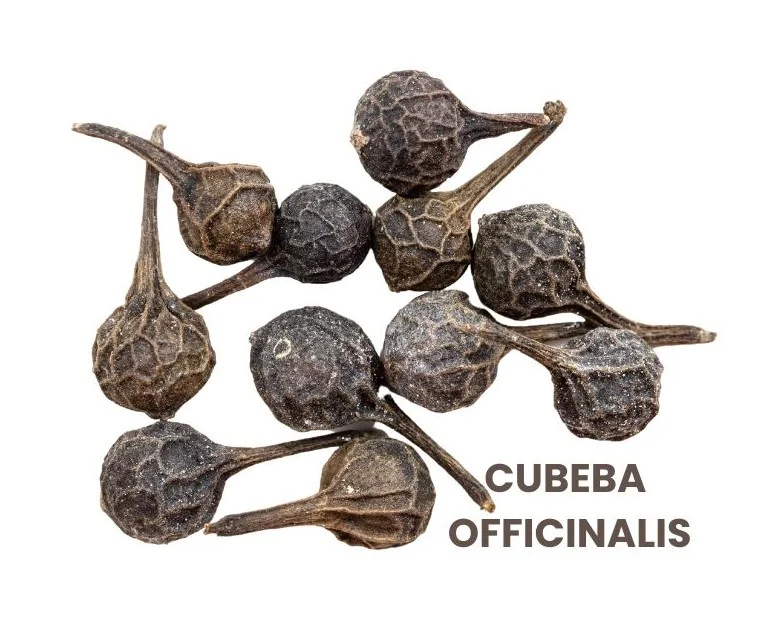Cubeba Officinalis, commonly known as Cubebs, is a medicinal plant used in homeopathy to address various conditions affecting the mucous membranes, especially those of the urinary tract.
It is particularly indicated for symptoms such as frequent urination and leucorrhoea in young girls.

Table of Contents
ToggleSOURCE INFORMATION
Scientific Classification
- Kingdom: Plantae
- Order: Piperales
- Family: Piperaceae
- Genus: Cubeba
- Species: Cubeba Officinalis
Origin
- Cubebs are native to the Indonesian archipelago and have been used for centuries in traditional medicine systems of Southeast Asia.
- They were introduced to Europe in the Middle Ages and gained popularity for their medicinal properties.
Historical Facts
- Cubebs have a long history of medicinal use in traditional Indonesian, Indian, and Chinese medicine.
- They were used to treat a variety of conditions, including respiratory infections, urinary tract disorders, and gastrointestinal issues.
- Cubebs were traded along the ancient spice routes and were highly valued for their therapeutic properties.
- In Europe, cubebs were included in medicinal preparations known as “electuaries” and were used as remedies for coughs, urinary problems, and digestive issues.
DRUG PATHOGENESIS
- Cubebs primarily affect the mucous membranes, particularly those of the urinary tract.
- They are indicated for conditions such as urethritis, cystitis, prostatitis, and leucorrhoea, where there is an excess of mucus production and irritation of the mucous membranes.
KEY CHARACTERISTICS
URINE
- Urethritis: Inflammation of the urethra, characterized by much mucus, particularly noticeable in women.
- Cutting after urination: Sharp, stinging pain experienced after urination, often accompanied by a feeling of constriction in the urethra.
- Hematuria: Presence of blood in the urine, indicating potential issues with the urinary tract.
- Prostatitis: Inflammation of the prostate gland, presenting with a thick yellow discharge.
- Cystitis: Inflammation of the bladder, leading to symptoms such as urinary urgency, frequency, and discomfort.
RESPIRATORY
- Catarrh of nose and throat: Excessive mucus production in the nasal passages and throat, often associated with inflammation or infection.
- Fetid odor: Offensive smell associated with the nasal discharge or expectoration.
- Mucus trickles from posterior nares: Mucus drainage from the back of the nasal passages into the throat.
- Rawness of throat: Soreness or irritation in the throat, possibly due to inflammation or excessive coughing.
- Hoarseness: Abnormal changes in the voice, resulting in a rough or harsh vocal quality.
MODALITIES
- Cubebs may be indicated for conditions aggravated by dampness or humidity.
- Symptoms may worsen with exposure to cold air or drafts.
WHAT ARE MODALITIES IN HOMOEOPATHY?
RELATIONSHIP WITH OTHER DRUGS
- Cubebs can be compared to other remedies such as Cucurbita, Copaiva, Piper methysticum, and Sandalwood, which also have affinities for the urinary tract and mucous membranes.
DOSE
- Cubebs are typically prepared in second and third attenuations for homeopathic use.
- The dosage and potency should be determined by a qualified homeopathic practitioner based on individual symptoms and characteristics.
Frequently Asked Questions
Can cubebs be used for urinary tract infections (UTIs)?
- Yes, cubebs are often used in homeopathy to address symptoms of urinary tract infections, including urethritis, cystitis, and haematuria.
Are cubebs safe for children?
- Cubebs may be safely used in children under the guidance of a qualified homeopathic practitioner.
- They are indicated for conditions such as leucorrhoea in little girls and can be beneficial when prescribed correctly.
Meaning of Difficult Words
- Urethritis: Inflammation of the urethra, the tube that carries urine from the bladder to outside the body.
- Cystitis: Inflammation of the bladder, often resulting in urinary frequency, urgency, and discomfort.
- Prostatitis: Inflammation of the prostate gland, which can cause symptoms such as painful urination and pelvic pain.
- Catarrh: Excessive discharge or buildup of mucus in the nose or throat, often associated with inflammation or infection.
- Fetid: Having an unpleasant or foul odour.
- Haematuria: Presence of blood in the urine, which may indicate an underlying urinary tract issue or infection.
- Constriction: Feeling of tightness or narrowing in a body part, such as the urethra.
